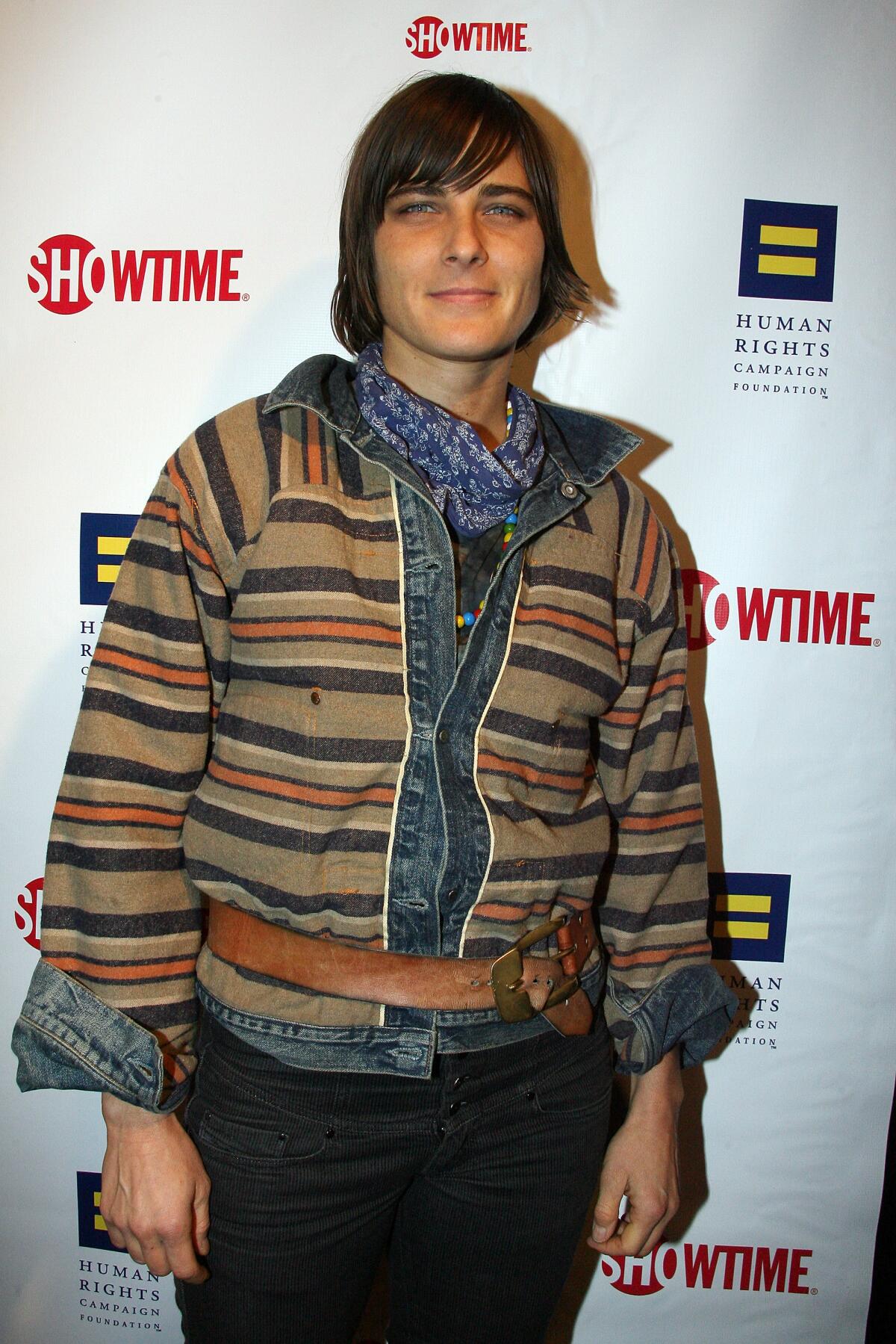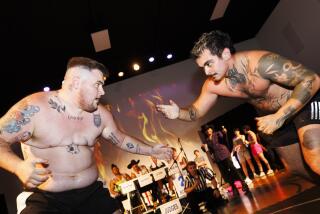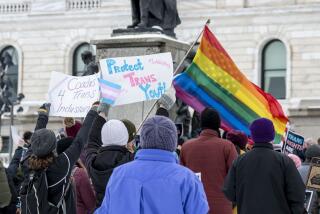âThe L Wordâ got trans men wrong. The sequel plans to make it right
Showtimeâs sequel to its pioneering queer women-centric soap âThe L Word,â subtitled âGeneration Q,â aims to expand on the work of the original â and right some of its well-documented wrongs. âThe L Word,â created by Ilene Chaiken, Michelle Abbott and Kathy Greenberg, has been criticized on other matters, including the decision to cast Iranian American actress Sarah Shahi as a Mexican American character, but none as controversial as its portrayal of transgender characters.
When âThe L Wordâ premiered in 2004, the series, about a group of lesbian and bisexual friends, challenged the prevailing treatment of queer women on television, frequently isolated, punished, featured in âvery special episodesâ or otherwise adjacent to the heterosexual leads. âThe L Wordâ played a significant role in changing the perception of lesbians, offering a sexy, emotional melodrama to counter the absence of positive representation. It was maddening for many viewers, then, when âThe L Wordâ introduced a trans man as stereotypical as lesbians and bisexual women had been in series written by outsiders for decades.
For the record:
3:39 p.m. Jan. 30, 2020A previous version of this story misidentified âThe L Wordâ actor Daniela Sea as a cisgender woman. Sea identifies as transgender non-binary/non-conforming.
Max Sweeney, played by Daniela Sea, entered âThe L Wordâ in its third season with the distinction of being televisionâs first-ever trans man series regular character. It was an exciting development in a series primarily made by and for the queer community, especially because previous depictions of trans men on TV â always played by cisgender actors â had generally been less than positive.
Those hopes were dashed by Maxâs tragic storyline, in which he is ostracized by his female friends, becomes manic and angry after taking testosterone, and unwittingly conceives a child before being abandoned by his cheating boyfriend. In particular, portraying medical transition as such a harrowing experience was devastating to trans men in the audience, whoâd only rarely found validation of their existence and experiences in the media.

âA lot of what was being represented for him, it just didnât have that much truth in it,â says trans actor Brian Michael Smith.
On âGeneration Q,â which premieres Dec. 8, Smith plays Pierce Williams, the community-minded campaign manager of mayoral candidate Bette Porter (played by returning series lead Jennifer Beals.) This time, though, there are two trans men in the main cast: Smith is joined by Leo Sheng as Micah, a gay adjunct professor of social work who lives with his friends, a lesbian couple. Sheng says he, too, found Max inauthentic on the original series, citing a scene in which Max comes out to a date who then calls him disgusting.
âI will say that Iâve talked to the trans guys behind the scenes, off set, and we are all here and hopeful that weâre doing something different,â Sheng says, referring to Smith, writer Thomas McBee and Tuck Dowrey, assistant to showrunner Marja-Lewis Ryan. âNot only because Iâm a trans actor playing a trans character, but because Micah isnât being seen with disgust or constantly being misgendered.â
Having McBee in the writers room helped shape the narratives around Pierce and Micah in an effort to portray trans men more accurately, says Ryan. A journalist and author who frequently writes about masculinity and his experience as a trans man, McBeeâs presence was invaluable, says Ryan, âso that we donât have to wonder. We can actually read his books and pull from his life experience rather than pulling from mine.â
McBee, too, took issue with Max on the original series.
âI wouldnât have taken the job if it felt like there was any sense that that was going to be repeated,â he says. âIn fact, I probably would have worked really hard to get folks involved like GLAAD who could help make sure that that didnât happen. But that wasnât the case. From the first conversation I had with Marja, she was super aware of those concerns.â
During the first iteration, there were no trans people in âThe L Wordâ writers room. Showrunner Chaiken said in an email that she consulted with a few trans men, including Nick Adams, a trans man and GLAADâs director of transgender media and representation for more than 20 years.
At GLAAD, Adamsâ work includes documenting the few and far between depictions of trans men and trans masculine people on television, but heâs helped to inform some of them too. His largely behind-the-scenes work involves presenting his research to networks and writers rooms, consulting on scripts, bringing in trans men to speak with showrunners and writers, answering questions, providing feedback, assisting casting agents in finding trans actors and offering media training for trans people in the public eye. His work on âDegrassi: Next Generationâ (which called Adams to help develop a trans teen character, Adam, in 2009) helped win the show a Peabody Award. Heâs also worked on MTVâs âFaking It,â Showtimeâs âShamelessâ and Freeformâs âThe Fosters.â
Adams confirmed that he had a two-hour conversation with Chaiken and the âL Wordâ writers room in April 2006, after Max had already been introduced on the series, but he did not consult on any scripts or at any other point in the seriesâ run.
âIn an ideal world, a show â especially a show thatâs going to have a transgender series regular or recurring character â will have trans people in the writers room who are influencing that character and their stories,â Adams says. But with McBee one of only three trans men writers currently on staff in writers rooms, Adams is still called upon to guide shows like âGreyâs Anatomy,â which wanted to create and cast a three-dimensional, true-to-life trans intern in 2017.
âAnd then our work continues on from that moment with many of these shows, in terms of looking at scripts, working on the character, making sure that the character breakdown is written well, working with the casting directors to help them find a pool of actors to choose from,â Adams says. âAnd then, ultimately, if the product that theyâre creating is a multidimensional authentic portrayal of a trans person, weâre excited, also, to be able to try to draw eyeballs to that show.â
For âGeneration Q,â McBee suggested Adams as a resource for additional questions Ryan had about gay trans men.
âSome of which are very embarrassing that I definitely wonât repeat to you,â Ryan says, laughing. âYou know, whatever questions I have that will lend authenticity, because I wonât know if itâs right or wrong, but a trans gay guy will totally know if Iâm getting it right or wrong. This is all about trying to reflect peopleâs real-life experiences and to not guess when I donât need to guess.â
Smith is black and Cheng is Chinese American, so both actors acknowledge they feel an added responsibility in creating visibility for trans men of color â until recently, with Ian Alexander of âThe O.A.,â Garcia of Netflixâs âTales of the Cityâ revival and Logan Razos of OWNâs âDavid Makes Man,â most trans men in film and television have been young and white. In that way, they say thereâs an educational aspect to their jobs, offering their own life stories to writers so they can accurately depict the specifics of their various intersecting identities and experiences.
âWhile we do have a trans writer and trans guys working with us on the show, Iâm the only one who knows my experiences,â Sheng says. âIâm the only one who can sort of talk about what itâs like to be a trans guy whoâs Asian â who is pretty binary in his experience but will always be seen as Asian first.â
Smith says Adams and GLAAD were invaluable to him as both he and his character publicly came out with a 2017 episode of OWNâs âQueen Sugar.â GLAAD has also helped Smith to amplify his voice as a black trans man, advocating for diverse representation of trans people. Through his GLAAD media training with Adams, Smith says he learned how to set boundaries for himself and that he could lean on GLAAD for support.
âHe really helped me learn how to address certain questions â you know, âYou donât have to say anything that youâre not comfortable saying; you donât have to speak this or that. Let us handle any education that you donât feel personally comfortable doing,ââ Smith says of Adams. âAnd just being able to speak to another trans man about this with was a godsend.â
âThe L Word: Generation Qâ
Where: Showtime
When: 10 p.m. Sunday
Rating: TV-MA (may be unsuitable for children under the age of 17)
More to Read
The complete guide to home viewing
Get Screen Gab for everything about the TV shows and streaming movies everyoneâs talking about.
You may occasionally receive promotional content from the Los Angeles Times.






